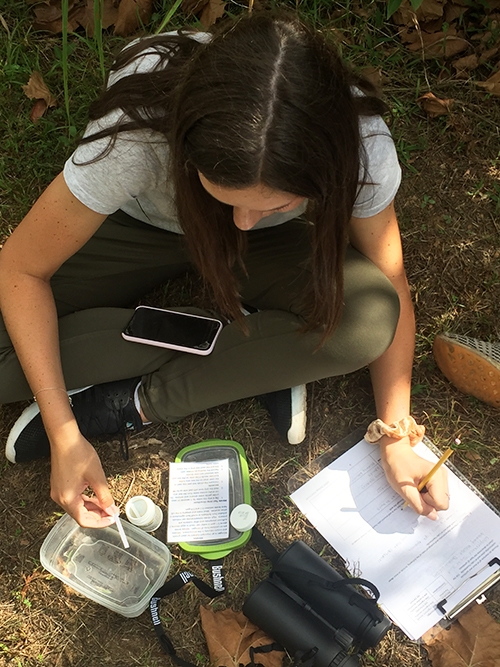U of A Graduate Receives Grant for Lab Equipment in First Science Teaching Job

A student measures nitrate levels in a water sample during a visit to Lake Fayetteville.
Matthew Holden, in his first year of teaching, received a grant this fall with fellow teacher Cameron Simpkins to purchase lab equipment for their science classes at Fayetteville High School.
Holden graduated in May from the Master of Arts in Teaching program at the University of Arkansas, during which Simpkins was one of his mentor teachers. The pair received a $10,000 Pendergraft Grant from the Fayetteville Public Education Foundation to help fund their project titled "Real-World Student-Led Investigations Using Authentic Scientific Instruments."
About 900 students in ninth and 10th grade biology classes will use authentic data collection instruments throughout the school year to record changes in abiotic and biotic parameters within aquatic environments. Abiotic refers to all of the non-living components of the environment while biotic refers to all of the living components in the environment and the interactions between them.
The research will culminate in a digital project to be shared with the public that recommends solutions to human impact issues. The project is based on Arkansas Next Generation Science Standards.
Previously, students had limited access to scientific instruments, according to the project proposal. With the grant funding, they can use Vernier sensors and probes to study changes in environmental parameters such as dissolved oxygen, temperature, gas pressure, and atmospheric carbon dioxide over time and compare measurements among various land uses to determine areas of greater pollution and environmental concern.
The new equipment hasn't arrived yet but students have already taken a field trip to the Lake Fayetteville Environmental Study Center to introduce them to the results of human impact on water quality in the area. During intermittent lab activities after the initial introduction to the importance of water quality testing, biology teachers will provide students with water samples from various bodies of water throughout Northwest Arkansas that represent a range of environmental conditions and watersheds, including urban, agricultural and forest.
Students will also have the opportunity to work with local watershed alliances — Beaver Watershed Alliance, Illinois River Watershed Alliance — to collect water samples. Analyzing changes over time and comparing measurements among different watersheds will allow students to determine which water sources are of greater environmental concern because of increased pollution.
In addition to measuring abiotic parameters, students will also analyze and compare biotic parameters such as species richness and diversity. This lesson will also be extended into genetics and evolution units as students investigate the effects of various chemicals such as pesticides and fertilizers on reproductive success.
Students will make either a website or video documentary details the scientific processes used in their studies as well as the results of their data analysis. The final project will also require students to recommend potential solutions for problems caused by human activities. The culminating project will provide students with an opportunity to have an authentic learning experience with the technological resources available to scientific professionals in the field. It will also increase student understanding of human impact and their relationship with the abiotic and biotic factors of their environment.
This project was funded through the Fayetteville Public Education Foundation. For more information, visit the foundation's website.
Topics
Contacts
Heidi S. Wells, director of communications
College of Education and Health Professions
479-575-3138,
heidisw@uark.edu
Headlines
Four Students Named Goldwater Scholars; Two Earn Udall Honorable Mentions
Four U of A students have received the prestigious Goldwater Scholarship, an award for top students in mathematics, science, and engineering.
Cross-Campus Collaboration Culminates in New Outdoor Geological Installation
Grand opening event to celebrate the new GeoLab installation at the U of A’s Gearhart Hall courtyard is set for May 3. The installation will be open to the public year-round.
First Students to Use Online Degree to Hone Nursing Leadership, Elevate Patient Care
Hanna Baxendale and Wendi Kimbrell will begin coursework in the Doctor of Nursing Practice-Executive Master of Business Administration program offered by the Eleanor Mann School of Nursing and Walton College.
Join the Office for Sustainability on a Final Cruise to Campus
Cruise to Campus Wednesdays have fostered a gathering space for individuals interested in biking to campus. Drop by the Old Main Lawn from 7:30-10 a.m. Wednesday for coffee, something to eat and conversation.
Fay Jones School Student Ambassador Program Gives Voice to Design Students
The student ambassador program at the Fay Jones School of Architecture and Design is built to connect top design students with their school, its alumni, its future students and others inside and outside the school.




